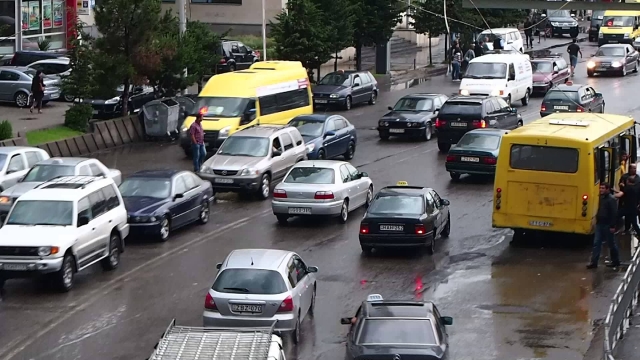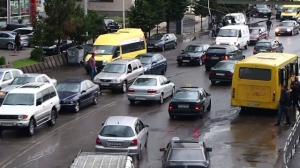Transport as Social Status and Segregation
TBILISI - Mobility is a major challenge throughout the world. The main reason could be the increasing number of cars.
Just putting the investment in car infrastructure and general access for private cars leave out such type of activities as trekking, cycling and the use of public transportation. Traffic jams are increasing, the environmental problems are getting worse and urban space is getting lost. If you cannot plan properly, you will definitely create more problems.
According to a survey carried out by the organization Collaboration for Green Transport public transport in Tbilisi is not attractive for citizens of middle (500-1000 GEL-10 %) and high (> 1000 GEL-1%) income classes.
They still admit that in spite of traffic jams a car is the most convenient means of transport to get to the place in time and comfortably. Another important aspect is gender classification. 78 % of women use public transport, whilst private car-users make up only 28 % of women.
Through low rates, better quality service and law intervals comfortable car parking is a priority that would improve the public transport system for its users. Transport culture in the country and Tbilisi is definitely focused on private car users. Why does Tbilisi favor only Jeeps? They take up public spaces daily in front of schools and houses.
Pedestrians and cyclists are nearly expelled from the streets. Using public transport, going on foot or just walking, the road divisions or lack of parking space in Tbilisi often drive citizens into confrontations and become the reason for conflicts.
Some districts of Tbilisi are less attractive to dwell in or to run a business and therefore remain uninhabited. There are feeble transport connections among them that are inconvenient to use and are inaccessible for most as well.
Transport plays the main role in the life of a person. We go to university, to work, shopping, to see our friends and join into various kinds of activities through means of transport. In fact the internet lessened the necessity of physical displacement although mobility still remains one of the most important aspects of a civil life. The work of the transportation system directly reflects the actual state of society.
Due to non-existent regulations on the import of cars and their low prices the number of problems are increasing. This causes the growth of private transport.
Unlike automobile infrastructure, public transport gets less attention, even though the demand for it is increasing. In terms of such an increased demand of transportation the development of public and alternative transport, going on foot is encouraged as a way out from that transport chaos that residents are concerned about.
Resources being spent on public transport development is a social investment in itself, that main reason must not be the direct form of financial gain, like what happened through the city’s mini-bus system reform. But on the contrary, we should understand that public transport is that sector that is not profitable in a financial way, but is essential to fully involve society in the daily life of the city.
The city will repay these expenses in the form of profit, which will be created for citizens to move from A- B in a safe and convenient manner through the revitalization of the streets and small business expansion.
Using public transport is less popular in such cities, where pedestrians and cyclists are exiled from the streets.
Public and types of alternative transport in Tbilisi, like walking and cycling, are less popular in planning our daily transportation. They are more attractive for low-income people. According to researcher Giorgi Kankia, planning the city while considering the individual scales is the main condition in order to create a contemporary urban environment for a city to be viable and attractive, that first of all means placement and daily use of pedestrian points to generate mobility and creating the mixed-use places.
Public transport and alternative models of movement as well are main elements in this process, while significance of vehicles has been minimized.
That is why we do it like European cities’, the central squares and streets, cafes, trading and other entertaining places.
From the planning schemes of our city and traffic the significance of private cars is a priority, which also increases its meaning and degrades the meaning of society.
Such segregation can be overcome only if the whole city would be under a private vehicle access control and within the certain period of time, a restriction of movement will be in some places.
It is necessary to create the city's parking spaces, that walking places for pedestrians, vehicles parking and will be followed by a ban on the movement of the zones and more zones for pedestrians will be created.
For instance-there are no access-entrances to the River Mtkvari, as well for public transports, as for pedestrians. There are just highways for transport where just private vehicles move and citizens are not able to approach the river safely and comfortably.
It is important to make public spaces over the bank of the river and encouragement the bicycle riding. It also worth noting to make some speed control in the city to respect other participants of the road traffic.
The most important thing is to develop sharing of the road and different types of alternative transport in Georgia. In other cases, the current social segregation and the unpopularity of public transport will continue to increase.
Author: Gela Kvashilava
Gela Kvashilava is the founder the Partnership for Road Safety fund (http://safedrive.ge), advisory council member and regional consultant of the British organization Eastern Alliance for Safe and Sustainable Transport (www.easst.co.uk), expert at the EU TRACECA road safety project.












